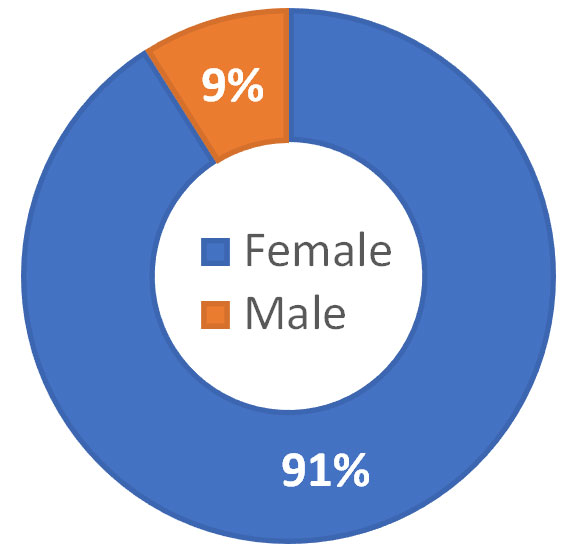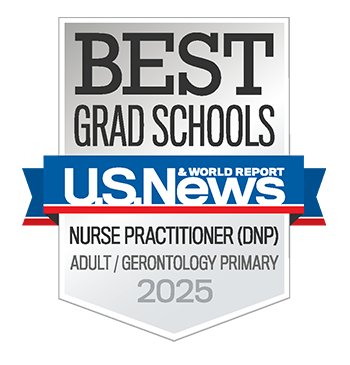DNP: Adult-Gerontological Primary Care Nurse Practitioner
Need your questions answered?
OVERVIEW
Supporting the adult patient
Become a DNP-prepared adult-gerontological primary care nurse practitioner all while taking advantage of resources found only at Johns Hopkins. You will learn to diagnose and manage acute and chronic primary health problems in adult patients and enhance your skills in physical and psychosocial assessment, clinical decision-making, and health promotion and disease prevention. In addition to your nurse practitioner training, the DNP provides you with the skills needed to develop, evaluate, advocate, and provide leaderships to transform health care at the organizational or system level.
Students will be prepared to take the Adult-Gerontology Primary Care Nurse Practitioner exam through the American Nurses Credentialing Center or through the American Academy of Nurse Practitioners.
In addition to advanced clinical training, the DNP provides the expertise needed to develop, evaluate, advocate, and transform health care through leadership, innovation, and evidence-based improvements at the organizational and systems levels. DNP graduates remain in practice, leading cross-professional teams to advance informed, high-quality healthcare.
The knowledge, skills, and abilities to lead such change are developed across the program and demonstrated through scholarly work that addresses meaningful healthcare improvement. This includes the DNP Project Scholarly work, which establishes each graduate as a Hopkins Nursing clinical scholar
Program Details
Tuition & Fees
Estimated Tuition Cost: $2,057 per credit See Cost of Attendance Details
Financial Aid: There are numerous options for financing your education including grants, scholarships, federal loans, and employment programs. Learn more.
Upcoming Application Deadlines
Fall entry: Nov 1 and Jan 15
Requirements
Admission Criteria
- Bachelor of Science in Nursing Degree or an entry-level nursing master’s degree from an ACEN or CCNE accredited college or university or an equivalent degree from a comparable foreign institution
- Scholastic GPA of at least 3.0 on a 4.0 scale
- Applicants must submit evidence of current nursing license. Online students must have or obtain RN license from an authorized state.
- One year of full-time RN experience preferred
- Three letters of recommendation (both academic and professional references; check FAQs for detailed guidance on completing this requirement)
- Official Transcripts (from all previous colleges/universities)
- Current Resume /CV (check FAQs for detailed guidance on completing this requirement)
- Goal statement
- GRE scores are accepted but not required
- Interview with faculty (if moved forward by admissions committee)
- TOEFL or IELTS if English is not your native language
Prerequisites
Undergraduate Statistics * Take at Hopkins Nursing. Course must be completed at a regionally accredited college or university with a letter grade of B or better. Grade of B- will not be accepted.
Students are required to maintain current licensure throughout the program. Additional RN licenses in surrounding states may be necessary to secure a clinical rotation. Where applicable, a current unencumbered compact (multistate) license will substitute for a single state license. Nursing licensure costs are the responsibility of the student.
* Topics should include correlation and linear regression; experimental design such as t-tests, analysis of variance and chi-square; suggested departments: psychology, sociology, education, biology, and mathematics. Statistics courses offered by business, management, and economics departments are typically more theory-based and lack the experimental design component.
State-specific Information for Online Programs
Students currently cannot conduct clinical activities in Louisiana and New York. Johns Hopkins University is approved by the Washington State Board of Nursing to conduct practice experiences in the state of Washington for Washington residents. For more information, please contact an admissions representative. Students should be aware of additional state-specific information for online programs.
Student Sponsorship
This program does not qualify for F-1 or J-1 student sponsorship. Legal Permanent Residents and non-immigrants who are otherwise physically present in the U.S. and in a status that allows for full or part-time study, may pursue this program.
DNP Advanced Practice profile based on Fall 23 cohort
* The profile encompasses all DNP NP tracks.
32%
Underrepresented Minority

91% Female/9% Male
29%
First Generation
16
Countries Represented
32
States Represented
30
Average Age
3
Average Years Nursing Experience
Curriculum
This program is offered in the online with course immersions format. Program may be completed in 74 credits and provides 960 clinical hours and 160 DNP practicum hours.
Plan of Study
For Current Students Admitted Fall 2023 and prior, please reference your Plan of Study.
3 Year Plan
* Indicates a semester with a required onsite immersion.
Advanced Physiology/Pathophysiology Part I (2)
Pharmacology for Advanced Practice Part I (2)
Application of Biostatistical Methods for Evidence-Based Practice (2)
Advanced Health Policy (2)
Health Promotion and Disease Across the Lifespan (2)
Pharmacology for Advanced Practice Part II (2)
Advanced Physiology/Pathophysiology Part II (2)
Diagnostic Reasoning I : Wellness in Primary care and Common Acute health Conditions in Adult Primary Care (3)
Advanced Health Assessment and Measurement for Advanced Practice Nurses (3) *
- Application of the Research Process to Evidence-Based Practice (2)
Diagnostic Skills and Procedures for Advanced Practice Nursing (1)
Diagnostic Reasoning II: Common Acute and Chronic Health Conditions in Adult Primary Care (3)
- Clinical Management I: Adult-Gerontology Nurse Practitioner (2.5, 200cl)
Healthcare Finance for Advanced Nursing Practice (2)
Organizational and Systems Leadership for Quality Healthcare (2)
- Diagnostic Reasoning III: Reproductive and Mental Health in Adult Primary Care (3)
- Clinical Management II: Adult-Gerontology Nurse Practitioner (2.5, 200cl) *
Diagnostic Reasoning IV Chronic, Complex and Multi-System Illnesses and Conditions in Adult Primary Care (3)
Scholarly Problem Discovery and Foundations of Nursing Leadership in Healthcare (2.5)
Scholarly Problem Discovery and Foundations of Nursing Leadership in Healthcare Practicum (0.5, 40hrs)
Inquiry for Scholarly Practice (3)
- Clinical Management III: Adult-Gerontology Nurse Practitioner (2, 160cl)
Translation of Evidence for Advanced Nursing Practice (1)
Evidence-Based Practice and Research Translation in Healthcare (2.5)
Evidence-Based Practice and Research Translation in Healthcare Practicum (0.5, 40hr)
Advanced Clinical Data Management for Evidence-Based Practice and Performance Improvement (2)
Advanced Applications of Information Technology in Healthcare Delivery (2)
Health Policy, Advocacy, and Legislation Transformation in Healthcare (1.5)
- Health Policy, Advocacy, and Legislation Transformation in Healthcare Practicum (0.5, 40 hrs)
- Clinical Management IV: Adult-Gerontology Nurse Practitioner (2.5, 200cl) *
- Elective (3)
Quality, Safety, and Systems Improvement and Dissemination in Healthcare (1.5)
Quality, Safety, and Systems Improvement and Dissemination in Healthcare Practicum (0.5, 40hrs)
Clinical Data Management and Analyses (2)
Clinical Management V: Adult-Gerontology Nurse Practitioner (2.5, 200cl)
- Elective (3)
Curriculum, credit hours, and sequencing are subject to change.
** Transfer Credits from the JHSON MSN (Entry into Nursing) Program to the DNP Advanced Practice Track can vary based on current curriculum & start date.
***A minimum of 1000 practice hours is required for DNP.
****Transfer of credit is granted on an individual basis. Please see the transfer of credit policy and complete the form to make a request.
“There are more opportunities than you can possibly ever take advantage of.” Anthony T. Pho
Anthony T. Pho
Engage with Us
Join us soon for a tour, on-campus event or a virtual visit.
Request Information
Speak with Admissions to learn more about our programs.
Virtual Info Sessions
See recordings of some of our recent virtual info sessions.
Tuition & Other Costs
Financial aid
Scholarships & Grants: Grants are awards based on financial need that do not have to be repaid. Many students also benefit from scholarships and awards based on merit. Learn more.
Loans: Many students will avail themselves of loans to help finance their School of Nursing education. If necessary, we encourage you to borrow only what is absolutely essential to cover your educational costs. Learn more.
Employment: Many students locate part-time employment to help pay education expenses. Numerous positions are available on campus and within various community based organizations. These jobs provide students with opportunities to gain practical work experience. Most positions are funded through the Federal Work-Study Program. Learn more.
Frequently Asked Questions
The DNP is a doctoral degree focused on the clinical practice of nursing. The degree represents the highest academic preparation for nursing practice. The DNP curriculum focuses on the knowledge needed to provide comprehensive direct care across settings. It can be conferred in conjunction with any specialty in advanced practice.
A strong foundation in courses such as anatomy and physiology, microbiology, pharmacology, and physical assessment with a grade of B or above is one key to success.
The curricular content will enable the graduate to make complex diagnoses, provide evidence-based treatment modalities, utilize sophisticated informatics and decision-making technology, and assimilate in-depth knowledge of biophysical, psychosocial, behavioral and clinical sciences.
The expanded competencies of the Doctor of Nursing Practice enable graduates to independently provide complex care across all settings including ambulatory, acute, community and home settings. For example, the expanded curriculum will focus on the utilization of evidence-based decision-making to admit and co-manage hospitalized patients, to provide advice and treatment initiated over the phone, and to initiate specialist referrals and evaluate the subsequent advice and initiate and participate in co-management.
There is only a 3-year plan option. A part time plan of study is not available.
The DNP Advanced Practice Track is completed over a 3-year period. As students begin to take specialized courses that prepare them for the respective role, they will be engaged in settings to learn their future role and in which the DNP Scholarly Project is situated. Hence, it will be challenging to maintain employment that is not flexible beyond the first year.
The DNP, or clinical doctorate, prepares the graduate to practice independently with the most complex patients, in any setting where the patient requires care, utilizing complicated informatics and evidence-based decision-making. Research doctorates prepare graduates to initiate and conduct sophisticated research projects, serving as the principal investigator.
The school accepts up to six credits of transfer from outside the Johns Hopkins University School of Nursing. Once admitted into the program you can request to transfer credits by completing the transfer of graduate credit form.
The School of Nursing follows the regular academic schedule (prospective students should note that these courses are not self-paced). Students are enrolled for the fall, spring, and summer terms. Prospective students should refer to the plans of study found on the curriculum pages for each specialty.
Please visit School of Nursing’s Tuition and Fees page for the current program costs.
For students admitted to the DNP Nurse Practitioner tracks, many of the courses and course content will be delivered in an online format with onsite immersions. Please refer to the course schedule for the upcoming semester for specific course delivery information.
The DNP program requires a minimum of 1000 practice hours. The majority of these hours will be in the clinical practicum where you will apply what you learn in the theory courses to gain the competence required for your particular specialty. The balance of the practice hours are devoted to the DNP practicum which focuses on the DNP Scholarly Project. Ideally, you will have one-year of RN experience before starting the first specialty clinical.
Many of the core courses will be taken by all DNP Advanced Practice students at the same time. This could be as many as 60 students. However, the track specialty courses will be taken with only students in that specific specialty. In clinical courses, there is a ratio of 1 to 6 students per clinical instructor with each student assigned to a preceptor.
Students in the same specialty and the same plan of study will move through as a cohort.
It is possible for students to negotiate a clinical site within their area of interest, but these cannot be guaranteed. The DNP Scholarly Project could allow students to identify a problem within a specific area and bring that together with the specialty role.
Clinical practicum experiences are determined by the student’s area of focus, student interest/experience, site and preceptor availability, and the student’s programmatic needs. The student works collaboratively with the Track Director and the Clinical Placement Team to request sites and identify preceptors, with final approval by the Track Director. Following an orientation to the electronic software system, the student will be responsible to complete clinical requests and upload required school and site compliance documentation by the due date. The due date is prior to the semester that includes a clinical course. Students will be working with the Clinical Placement Team throughout the course of their program. The Clinical Placement Team participates in orientation, advising sessions, and on-site immersions. The student is encouraged to work collaboratively and proactively with the Clinical Placement Team. An all-hands on approach yields optimal preceptor opportunities. Unauthorized states for clinicals include LA and NY. Admitted students who decide to enroll will be required to sign the “Student Expectations in the Clinical Placements Process” document prior to their first term in the program. For more information on Clinical Placement Services, visit https://nursing.jhu.edu/clinical-placement/.
The American Association of Colleges of Nursing requires that all DNP Projects should:
Focus on a change that impacts healthcare outcomes either through direct or indirect care.
Have a systems (micro-, meso-, or macro- level) or population/aggregate focus.
Demonstrate implementation in the appropriate arena or area of practice.
Include a plan for sustainability (e.g. financial, systems or political realities, not only theoretical abstractions).
Include an evaluation of processes and/or outcomes (formative or summative). DNP Projects should be designed so that processes and/or outcomes will be evaluated to guide practice and policy. Clinical significance is as important in guiding practice as statistical significance is in evaluating research.
Provide a foundation for future practice scholarship.
There are four DNP Scholarly Project courses that sequentially reflect the stages of evidence based practice quality improvement and have incorporated DNP practicum hours: Problem Discovery, Project Advancement, Project Application, and Project Evaluation and Dissemination. The DNP Scholarly Project is situated in the clinical setting where the student will carry it out. As the project is a quality improvement focus, key stakeholders in the practice setting are necessary to identify clinical problems they want to address and for which they want to partner with a student or team of students. See your plan of study for the number of practicum hours associated with each course associated with the DNP Scholarly Project.
At least one letter should come from a recent or current direct supervisor/manager (the person who is responsible for your performance evaluation)
At least one letter should come from an academic faculty member who can speak to your ability to successfully complete a demanding graduate level academic and clinical program.
The third letter can come from a second academic faculty member or an individual in a leadership position who can speak to your clinical abilities.
Personal references from colleagues, friends, or family members do not meet the requirement.
If you are unable to provide one of the reference letters above, please upload a statement of explanation to your application.
Please include the following information in your resume or CV:
Work experience (include dates, sites and locations; paid and unpaid; any residency participation)
Education Background
Scholarly activities (research, presentations, publications, honors, awards)
Professional activities (leadership, certifications, professional organization membership, service on committees)
Community Service/Volunteerism





